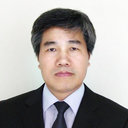Anti-Neuroinflammatory Effects of Uncaria sinensis in LPS-Stimulated BV2 Microglia Cells and Focal Cerebral Ischemic Mice.
Açar sözlər
Mücərrəd
Uncaria sinensis (US) has long been used as a traditional Korean medicine to treat cardiovascular and central nervous system diseases, including hypertension and cerebral ischemia. Several recent studies have indicated that US has neuroprotective and cerebrovascular protective effects in ischemic brain injury; however, little is known about the anti-inflammatory effects of US. Therefore, the present study was designed to validate the anti-inflammatory effects of US. The anti-neuroinflammatory properties of US on pro-inflammatory mediators were investigated in lipopolysaccharide (LPS)-stimulated murine BV2 microglia and injured brains induced by photothrombotic cortical ischemia. Hexane extracts of US (HEUS) significantly suppressed the production of nitric oxide (NO) and prostaglandin E2 (PGE2) in LPS-stimulated BV2 microglia and inhibited LPS-induced expression of iNOS and COX-2 in a dose-dependent manner without causing cytotoxicity in BV2 cells. In addition, HEUS significantly reduced the generation of pro-inflammatory cytokines, including TNF-α, IL-1β, and IL-6. Moreover, HEUS treatment inhibited the transcriptional activity and nuclear translocation of NF-κB in LPS-stimulated BV2 cells. In an in vivo study, treatment of HEUS resulted in significantly reduced infarct volume and improved neurological function 48 h after ischemic brain injury, possibly through the inhibition of the production of pro-inflammatory cytokines. HEUS inhibits LPS-stimulated production of pro-inflammatory mediators and prevents cerebral ischemic damage, suggesting that US may have therapeutic potential for the prevention and treatment of ischemic stroke accompanied by microglia activation.


